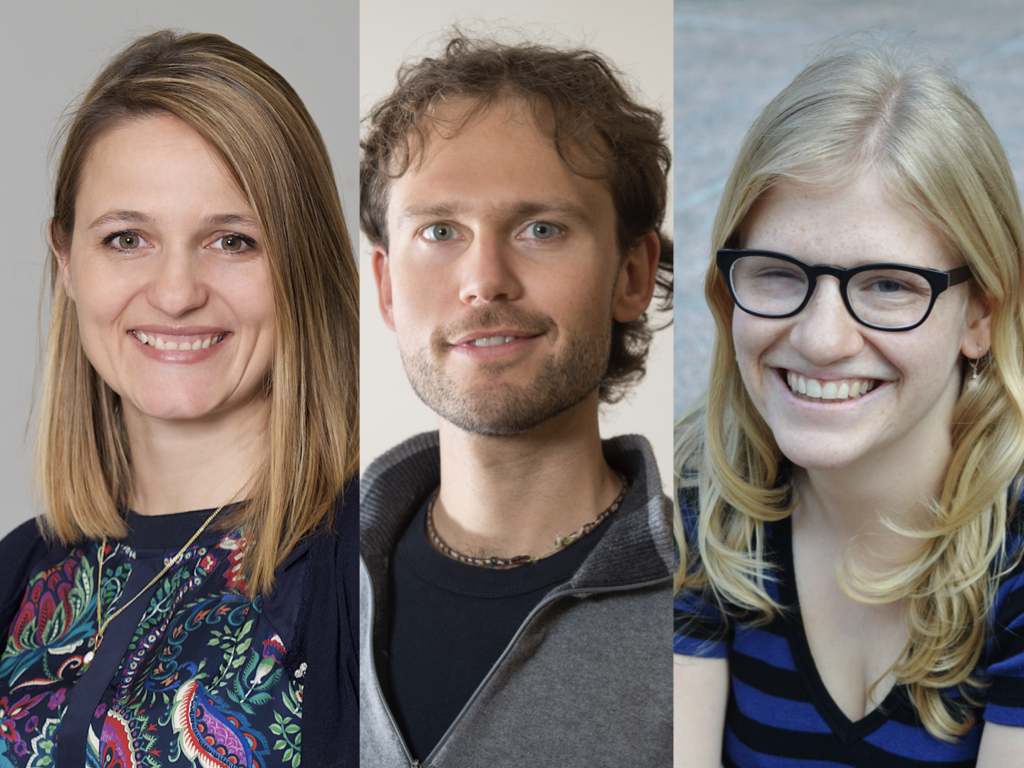
A fresh approach to studying collective behaviour
An interdisciplinary course on computational modelling of collective systems is launched by the Centre for the Advanced Study of Collective Behaviour
A new academic program, Current Trends in Computational Modelling of Collective Systems, is running this winter semester led by experts from the Centre for the Advanced Study of Collective Behaviour.
The interdisciplinary graduate program, directed by course coordinators across the departments of biology (Ariana Strandburg-Peshkin and Jacob Davidson) and computer science (Tatjana Petrov), will be offered from October 2019 to February 2020.
“This course will introduce students from a variety of disciplines to the latest research in collective behaviour, a topic of particular interest since the new Centre for the Advanced Study of Collective Behaviour has been established here is Konstanz,” says Ariana Strandburg-Peshkin, a principal investigator at the Centre for the Advanced Study of Collective Behaviour.
Collective systems are dynamic, interactive, and complex. Researchers studying collectives at every level—molecular, cellular, organismal, and ecosystem—are increasingly turning to modelling and computational data analysis in order to describe and make sense of these systems.
The course captures this timely interest in computational modelling, but reimagines the traditional lecture-based curriculum—offering instead a selection of prominent papers on modelling collective phenomena, which are explored to gain an understanding of the hypotheses, modelling, data measurements and parameters of each study. This will provide an overview of the research questions related to collective phenomena as well as the formalisms and simulation/analysis techniques used to analyse them.
“It was clear that students from computer science and biology wanted a journal club-style meeting where we could discuss seminal, as well as recent influential, papers on the topic of computational aspects of modelling collectives,” says Tatjana Petrov, a principal investigator at the Centre for the Advanced Study of Collective Behaviour.
“A seminar course format seemed like a great idea because it engages graduate students from both departments who are interested in the topics. We think this approach of reading and discussing recent scientific papers introduces students to a broad spectrum of research topics and will allow them to work more closely with the Centre for the Advanced Study of Collective Behaviour.”
The papers for each semester are chosen by the students from a large pool of possibilities. Examples include papers on group dynamics in pigeon flocks and global migratory patterns in white storks, which, when examined together, show how field data can be used to infer social interactions and leadership in moving animal groups. Or, papers that present new approaches in using artificial intelligence to help define behaviour based on patterns in the data instead of human-defined parameters.
Each seminar session will start with a 5-minute quiz on the paper that has been set for that class—an element that Petrov says is very well received in other courses. “The feedback is always that this quiz, while intimidating in the beginning, allows students to engage more effectively in discussions. The seminar then continues with discussions based on a literature survey, understanding the papers' contributions, and proposing novel ideas.
The curriculum goes a step further to develop skills in graduate students that are relevant to research and academia: based on the papers discussed in lectures, students will then have to develop their own research ideas and write short grant proposals about them.
“The purpose of this exercise is to get the students thinking about what they could work on if they chose to go into this area, and also to give them some initial experience in coming up with their own research ideas and writing grants,” says Strandburg-Peshkin.
Ultimately, the program will give students an overview of current research on collective behaviour, with additional insight into the various questions and challenges that arise, as well as some of the computational methods used to tackle those. “I hope that students will be motivated and inspired to continue research on some of the topics discussed in class,” says Petrov.
Current Trends in Computational Modelling of Collective Systems runs from Oct 23, 2019 - Feb 12, 2020. It is open to graduate students and researchers from other departments, especially those affiliated to the Centre for the Advanced Study of Collective Behaviour.
ABOUT THE COURSE INSTRUCTORS
Tatjana Petrov
Tatjana’s research lies at the interface of theoretical computer science and mathematical modelling, and her favourite application of interest are biological systems. Prior to becoming a Junior Professsor in the Department of Computer and Information Science, Tatjana was a postdoctoral Fellow at IST Austria, and she obtained her PhD in 2013 at ETH Zürich. During her PhD, she held long research stays at École polytechnique fédérale de Lausanne and at Harvard Medical School.
Jacob Davidson
Jacob is a theoretical biologist currently doing postdoctoral research at the Max Planck Institute for Ornithology, Department of Collective Behaviour. After completing his PhD at the University of Michigan, he moved to the Center for Neuroscience at University of California, Davis to work as part of an interdisciplinary collaboration with experimental biologists at Stanford University. His interest in teaching computational modeling stems from his time at the Marine Biological Laboratory in Wood’s Hole in 2015 and 2016, where he was an assistant for the course Methods in Computational Neuroscience. His current research is in the areas of quantitative behavioral analysis, and collective motion and decision-making.
Ariana Strandburg-Peshkin
Ariana is a Gips-Schüle Research Group Leader & Zukunftskolleg Fellow at the University of Konstanz. She studies the mechanisms and consequences of collective behavior in biological and social systems. She is especially interested in understanding how animal groups make collective decisions and coordinate collective action, and in particular how these processes are affected by the social relationships between group members and the communication strategies they employ. She works across a range of study systems to tackle these questions, in close collaboration with researchers across a variety of disciplines.
